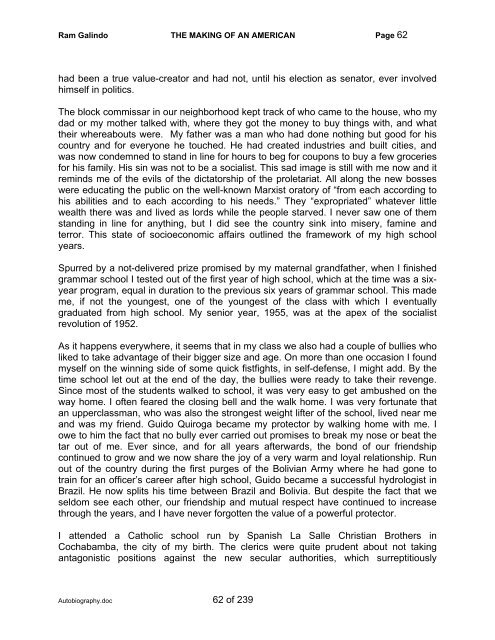Autobiography - The Galindo Group
Autobiography - The Galindo Group
Autobiography - The Galindo Group
You also want an ePaper? Increase the reach of your titles
YUMPU automatically turns print PDFs into web optimized ePapers that Google loves.
Ram <strong>Galindo</strong> THE MAKING OF AN AMERICAN Page 62<br />
had been a true value-creator and had not, until his election as senator, ever involved<br />
himself in politics.<br />
<strong>The</strong> block commissar in our neighborhood kept track of who came to the house, who my<br />
dad or my mother talked with, where they got the money to buy things with, and what<br />
their whereabouts were. My father was a man who had done nothing but good for his<br />
country and for everyone he touched. He had created industries and built cities, and<br />
was now condemned to stand in line for hours to beg for coupons to buy a few groceries<br />
for his family. His sin was not to be a socialist. This sad image is still with me now and it<br />
reminds me of the evils of the dictatorship of the proletariat. All along the new bosses<br />
were educating the public on the well-known Marxist oratory of “from each according to<br />
his abilities and to each according to his needs.” <strong>The</strong>y “expropriated” whatever little<br />
wealth there was and lived as lords while the people starved. I never saw one of them<br />
standing in line for anything, but I did see the country sink into misery, famine and<br />
terror. This state of socioeconomic affairs outlined the framework of my high school<br />
years.<br />
Spurred by a not-delivered prize promised by my maternal grandfather, when I finished<br />
grammar school I tested out of the first year of high school, which at the time was a sixyear<br />
program, equal in duration to the previous six years of grammar school. This made<br />
me, if not the youngest, one of the youngest of the class with which I eventually<br />
graduated from high school. My senior year, 1955, was at the apex of the socialist<br />
revolution of 1952.<br />
As it happens everywhere, it seems that in my class we also had a couple of bullies who<br />
liked to take advantage of their bigger size and age. On more than one occasion I found<br />
myself on the winning side of some quick fistfights, in self-defense, I might add. By the<br />
time school let out at the end of the day, the bullies were ready to take their revenge.<br />
Since most of the students walked to school, it was very easy to get ambushed on the<br />
way home. I often feared the closing bell and the walk home. I was very fortunate that<br />
an upperclassman, who was also the strongest weight lifter of the school, lived near me<br />
and was my friend. Guido Quiroga became my protector by walking home with me. I<br />
owe to him the fact that no bully ever carried out promises to break my nose or beat the<br />
tar out of me. Ever since, and for all years afterwards, the bond of our friendship<br />
continued to grow and we now share the joy of a very warm and loyal relationship. Run<br />
out of the country during the first purges of the Bolivian Army where he had gone to<br />
train for an officer’s career after high school, Guido became a successful hydrologist in<br />
Brazil. He now splits his time between Brazil and Bolivia. But despite the fact that we<br />
seldom see each other, our friendship and mutual respect have continued to increase<br />
through the years, and I have never forgotten the value of a powerful protector.<br />
I attended a Catholic school run by Spanish La Salle Christian Brothers in<br />
Cochabamba, the city of my birth. <strong>The</strong> clerics were quite prudent about not taking<br />
antagonistic positions against the new secular authorities, which surreptitiously<br />
<strong>Autobiography</strong>.doc 62 of 239


